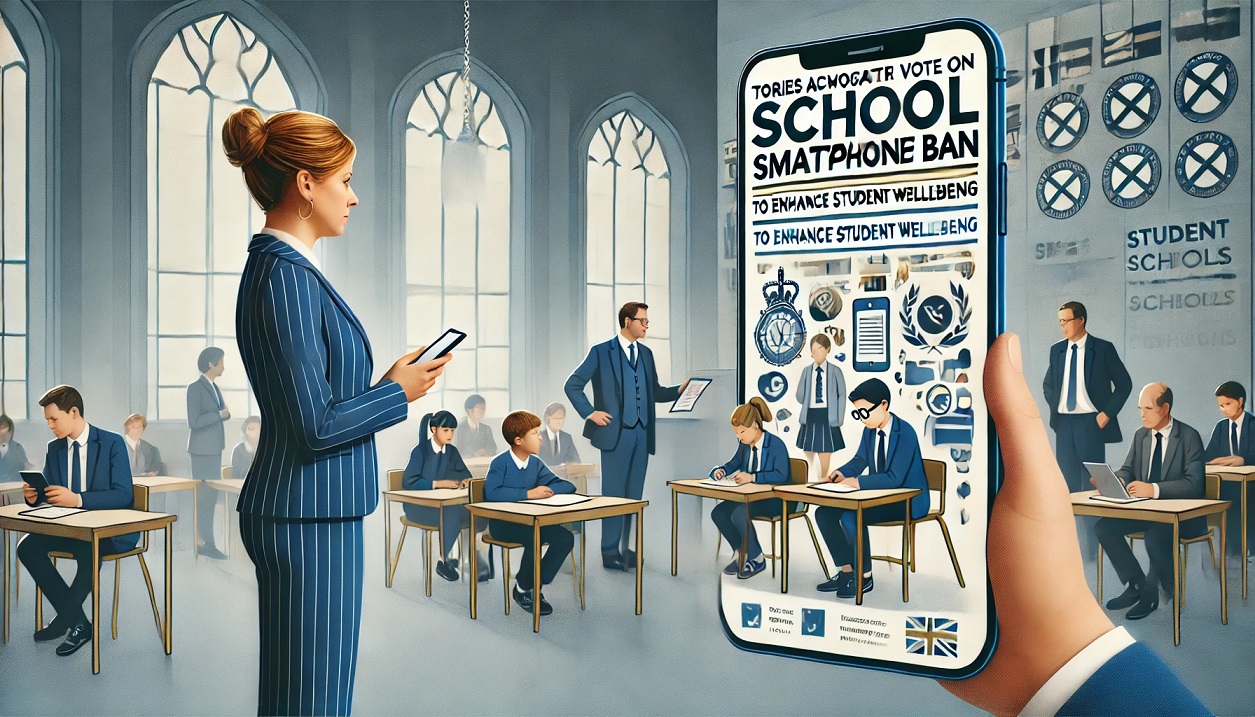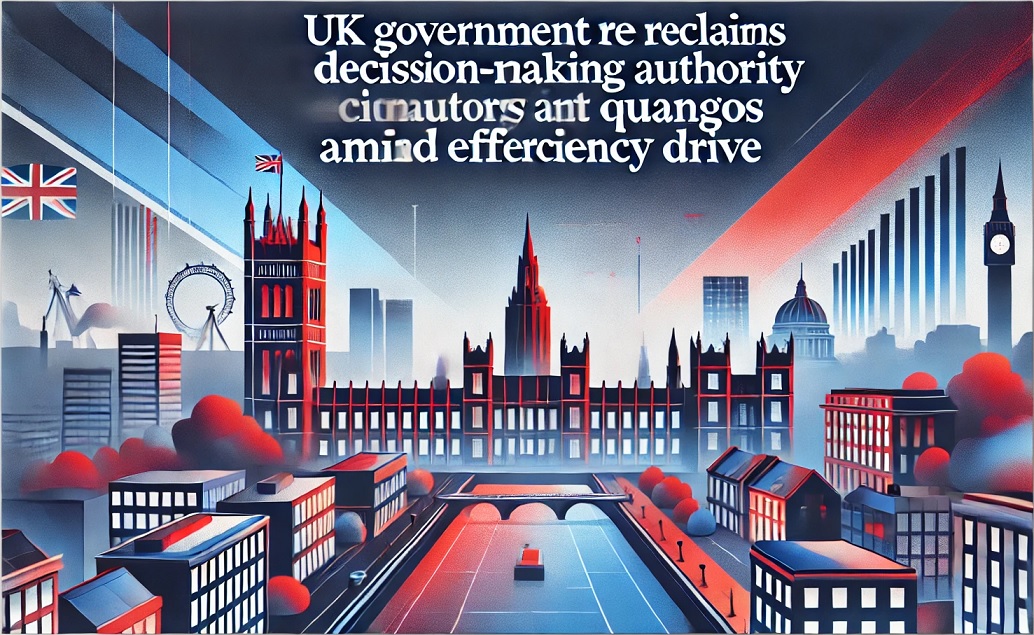The Conservative Party is pushing for a parliamentary vote to implement a nationwide ban on smartphone use in schools, aiming to improve student behavior and academic performance. This move has sparked a national debate on the role of technology in education.
In a bold move to enhance student wellbeing and academic performance, the Conservative Party is advocating for a parliamentary vote to ban smartphone use in schools across England. This initiative aims to address growing concerns about digital distractions and their impact on the educational environment.
Key Aspects of the Proposed Smartphone Ban
📵 Nationwide Prohibition of Smartphones in Schools
- Policy Proposal: The Conservatives propose a comprehensive ban on students using or carrying smartphones during school hours.
- Rationale: Studies indicate that smartphones contribute to classroom disruptions and negatively affect student behavior.
- Implementation: Students would be required to hand in their phones at the start of the school day and retrieve them upon departure.
🏫 Amendment to the Children's Wellbeing and Schools Bill
- Legislative Action: The Conservatives plan to amend the existing Children's Wellbeing and Schools Bill to enforce the smartphone ban.
- Political Strategy: By integrating the ban into current legislation, the party seeks to expedite its adoption and implementation.
📊 Public Engagement and Support
- Petition Launch: A public petition has been initiated to garner support for the smartphone ban, reflecting widespread parental concern over digital distractions.
- Community Involvement: The campaign has received significant backing from parents and educators advocating for reduced smartphone usage among students
Benefits of Banning Smartphones in Schools
🎓 Enhanced Academic Performance
- Improved Focus: Removing smartphones can lead to increased student concentration during lessons.
- Higher Achievement: Schools enforcing smartphone bans have reported better academic results.
🧠 Better Mental Health
- Reduced Anxiety: Limiting smartphone use may decrease social media-induced stress among students.
- Increased Social Interaction: Encouraging face-to-face communication fosters healthier peer relationships.
🚸 Improved Classroom Behavior
- Fewer Disruptions: Teachers experience fewer interruptions, leading to a more conducive learning environment.
- Enhanced Discipline: Clear policies on smartphone use contribute to better overall student conduct.
Potential Drawbacks and Concerns
❌ Enforcement Challenges
- Resource Allocation: Schools may need additional staff to manage the collection and return of devices.
- Compliance Issues: Ensuring all students adhere to the ban could be difficult.
❌ Safety Considerations
- Emergency Communication: Parents might be concerned about reaching their children during school hours.
- After-School Coordination: Students may rely on smartphones for transportation arrangements post-school.
❌ Technological Integration in Education
- Learning Tools: Smartphones can serve as educational aids, and a ban might limit access to digital resources.
- Digital Literacy: Restricting smartphone use could impede the development of essential tech skills.
Community Reactions and Expert Opinions
🗣️ Parental Perspectives
- Support for the Ban: Many parents endorse the initiative, citing concerns over distractions and mental health.
- Opposition Views: Some parents believe in teaching responsible smartphone use rather than implementing an outright ban.
🧑🏫 Educator Insights
- Positive Feedback: Teachers report smoother classroom management in environments without smartphones.
- Alternative Approaches: Some educators advocate for controlled smartphone use to integrate technology into learning.
🧑⚕️ Mental Health Experts
- Benefits Highlighted: Experts emphasize the potential mental health improvements from reduced screen time.
- Balanced Approach: There are calls for comprehensive strategies addressing both smartphone use and overall digital wellbeing.
International Perspectives on School Smartphone Bans
🌍 Global Trends
- European Initiatives: Several European countries have implemented similar bans with positive outcomes.
- U.S. Policies: Various U.S. states are considering or have enacted restrictions on smartphone use in schools.
📈 Comparative Outcomes
- Academic Improvements: Schools with bans have reported enhanced student performance.
- Behavioral Benefits: Reduced smartphone access correlates with better student behavior globally.
Technological Solutions and Alternatives
📱 Controlled Smartphone Use
- Educational Apps: Allowing access to specific learning applications during class.
- Time-Restricted Usage: Implementing scheduled periods for smartphone use under supervision.
🔒 Device Management Systems
- Network Restrictions: Schools can limit access to non-educational content on their networks.
- Monitoring Software: Utilizing applications to oversee and control smartphone usage during school hours.
Conclusion
The Conservative Party's push for a parliamentary vote to ban smartphones in schools aims to enhance student wellbeing and academic outcomes. While the proposal has garnered support from various stakeholders, it also raises concerns about enforcement and the role of technology in education. As the debate continues, finding a balanced approach that addresses both the benefits of reduced screen time and the need for digital literacy will be crucial. If the proposed ban is passed into law, it could reshape the educational landscape in the UK, potentially setting a precedent for other nations.
As discussions progress, stakeholders—including parents, teachers, students, and policymakers—must collaborate to ensure a solution that prioritizes both student wellbeing and future technological preparedness. Whether through an outright ban or regulated smartphone use, the goal remains clear: fostering a better learning environment for the next generation.
Final Thoughts: A Step Towards Distraction-Free Learning?
The debate over smartphones in schools is far from over. While evidence suggests that banning them could enhance focus, behavior, and academic performance, critics argue that technology is an integral part of modern education. As the Conservative Party pushes for a parliamentary vote, all eyes are on whether the UK will take this major step toward reshaping classroom dynamics.
Will this policy bring the intended improvements, or will it spark unintended challenges? The coming months will reveal whether the smartphone ban will redefine the education system—or simply add another layer to the ongoing digital dilemma.
📢 Have Your Say!
Do you support the smartphone ban in schools? Should students have restricted access or complete freedom? Share your thoughts in the comments below!

















Comments 0